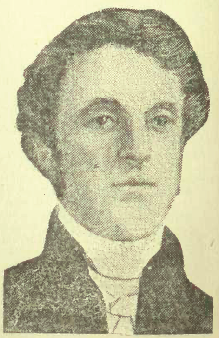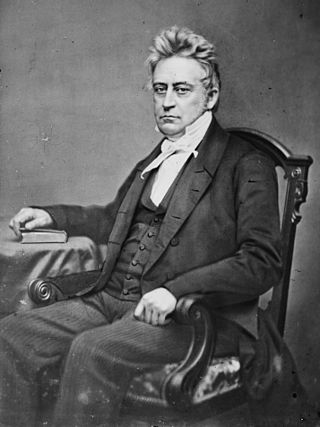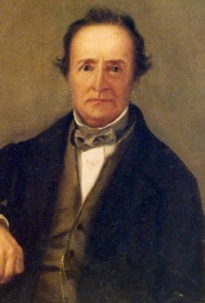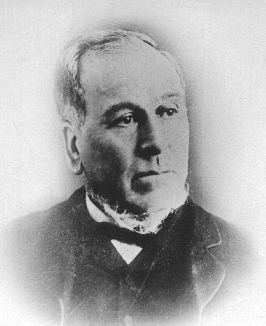Related Research Articles

The Province of Upper Canada was a part of British Canada established in 1791 by the Kingdom of Great Britain, to govern the central third of the lands in British North America, formerly part of the Province of Quebec since 1763. Upper Canada included all of modern-day Southern Ontario and all those areas of Northern Ontario in the Pays d'en Haut which had formed part of New France, essentially the watersheds of the Ottawa River or Lakes Huron and Superior, excluding any lands within the watershed of Hudson Bay. The "upper" prefix in the name reflects its geographic position along the Great Lakes, mostly above the headwaters of the Saint Lawrence River, contrasted with Lower Canada to the northeast.

William Lyon Mackenzie was a Scottish Canadian-American journalist and politician. He founded newspapers critical of the Family Compact, a term used to identify elite members of Upper Canada. He represented York County in the Legislative Assembly of Upper Canada and aligned with Reformers. He led the rebels in the Upper Canada Rebellion; after its defeat, he unsuccessfully rallied American support for an invasion of Upper Canada as part of the Patriot War. Although popular for criticising government officials, he failed to implement most of his policy objectives. He is one of the most recognizable Reformers of the early 19th century.

Henry Sherwood, was a lawyer and Tory politician in the Province of Canada. He was involved in provincial and municipal politics. Born into a Loyalist family in Brockville in Augusta Township, Upper Canada, he studied law and was called to the bar of Upper Canada in 1828. In 1838, he was appointed Queen's Counsel. Sherwood was part of the Family Compact, the inter-connected families of strong British and Loyalist sympathies which dominated the government of Upper Canada in the early years of the 19th century
The 9th Parliament of Upper Canada was opened 11 January 1825. Elections in Upper Canada had been held in July 1824. All sessions were held at York, Upper Canada. This parliament was dissolved 24 June 1828.

Marshall Spring Bidwell was a lawyer and political figure in Upper Canada.
Benajah Mallory was a farmer, merchant and political figure in Upper Canada.

George Strange Boulton was a lawyer and political figure in Upper Canada.
Henry John Boulton, was a lawyer and political figure in Upper Canada and the Province of Canada, as well as Chief Justice of Newfoundland.
David McGregor Rogers was a farmer and Member of the 2nd Parliament of Upper Canada.

John Cook was a merchant and political figure in Upper Canada and Canada West.

William Chisholm was a farmer, businessman and political figure in Upper Canada.

Donald Bethune was a lawyer, judge, entrepreneur and political figure in Upper Canada.
Lawrence Lawrason was a businessman and political figure in Canada West.

Lt.-Colonel The Hon. Alexander Auldjo was a businessman and political figure in Lower Canada.
Edward Greive was a businessman and political figure in Canada East. He was also the brother-in-law of William Walker and son-in-law of Mathew Bell.

William Durie Lyon was a merchant and political figure in Ontario, Canada.

James Lyons Biggar was an Ontario merchant and political figure. He represented Northumberland East in the House of Commons of Canada from 1874 to 1878 as an Independent Liberal.
Benjamin Ewing was a farmer, businessman and political figure in Upper Canada. He represented Northumberland in the Legislative Assembly of Upper Canada in 1825 and from 1828 to 1830.
Samuel Street Wilmot was a surveyor, tanner, farmer and political figure in Upper Canada. He represented Durham in the Legislative Assembly of Upper Canada from 1820 to 1824.
The Types Riot was the destruction of William Lyon Mackenzie's printing press and movable type by members of the Family Compact on June 8, 1826, in York, Upper Canada. The Family Compact was the ruling elite of Upper Canada who appointed themselves to positions of power within the Upper Canadian government. Mackenzie created the Colonial Advocate newspaper and published editorials in the paper that accused the Family Compact of incompetence and profiteering on corrupt practices, offending the rioters. It is not known who planned the riot, although Samuel Jarvis, a government official, later claimed he organized the event. On the evening of June 8, 9–15 rioters forced their way into the newspaper offices and destroyed property. During the event, Mackenzie's employees tried to get passersby to help stop the rioters. Bystanders refused to help when they saw government officials like William Allan and Stephen Heward were watching the spectacle. When the rioters finished destroying the office, they took cases of type with them and threw them into the nearby bay.
References
- ↑ Walter Lewis. "Richardson, James". Dictionary of Canadian Biography. Retrieved 14 June 2013.
After his discharge Richardson quickly reestablished himself as a Kingston merchant, setting up a partnership with his son-in-law, James Lyons.